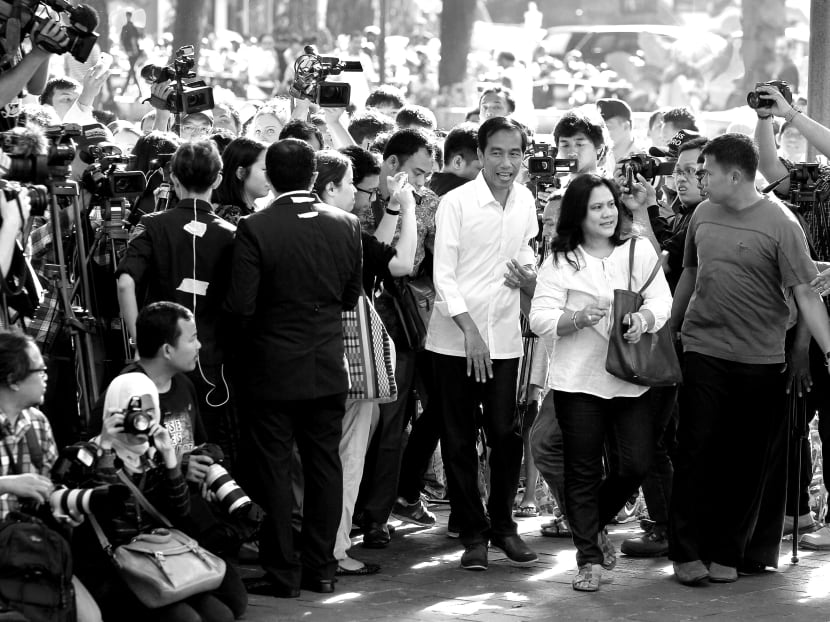Indonesia bucks Asia’s strongman trend
Like party platforms in the West, the election manifesto issued this week by India’s Bharatiya Janata Party (BJP) is filled with grand, almost certainly unattainable promises (proper housing for 1.2 billion Indians by 2022!). It favours the kind of McKinsey-speak beloved by standard-bearer Narendra Modi (remove bottlenecks and missing links!).

A strong electoral showing by Mr Widodo (seen here with his wife Iriana) and his party would demonstrate an appetite for a different kind of Asian reformist leader. Photo: Reuters
Like party platforms in the West, the election manifesto issued this week by India’s Bharatiya Janata Party (BJP) is filled with grand, almost certainly unattainable promises (proper housing for 1.2 billion Indians by 2022!). It favours the kind of McKinsey-speak beloved by standard-bearer Narendra Modi (remove bottlenecks and missing links!).
It also includes a few more ominous pledges, such as revising and updating India’s no-first-use doctrine on nuclear weapons and creating a legal framework to “protect and promote cow and its progeny” — a long-standing cause among right-wing Hindus. Although those issues may be particular to India, they set Mr Modi and the BJP firmly in what might be considered the new Asian mainstream.
REFORMIST AND NATIONALIST AGENDAS
From Mr Shinzo Abe in Japan, to Mr Xi Jinping in China and Ms Park Geun Hye in South Korea, leaders who combine reformist economic agendas with nationalist assertiveness — bordering on belligerence — now helm some of Asia’s most important countries.
Like them, Mr Modi subtly blends his economic and political messages. Reform is a means to an end — a way to rejuvenate the nation, avenge past humiliations and develop regional and global clout. The advent of such leaders has given a welcome jolt to the cause of reform. But it has also exacerbated frictions and dangerously raised the odds of conflict in the region.
That is what makes yesterday’s parliamentary elections in Indonesia so interesting. The vote will provide an early test of the popularity of Jakarta Governor Joko Widodo, the front-runner for President. (Under Indonesia’s mixed system, only parties that win 25 per cent or more of the vote, or that cobble together a coalition with at least 20 per cent of the seats in Parliament, can nominate candidates for July’s presidential elections.) A strong showing by Mr Widodo’s Indonesian Democratic Party-Struggle (PDI-P) would demonstrate an appetite for a very different kind of Asian reformist leader.
Both India and Indonesia are huge and sprawling, and encompass vast linguistic and regional differences. They are multi-ethnic and multi-faith societies, although each is dominated by a single community (Muslims in Indonesia, Hindus in India). Voters in both nations complain about policy drift, economic stagnation and official corruption under incumbents who have been in power too long. There is a powerful craving for competent, clean government that can deliver services and economic growth. Young, first-time voters — many of them newly urban — are set to redraw political maps that have long been defined by more conservative, rural vote blocs.
INDONESIANS COOL ON STRONGMAN-REFORMER?
Yet for their part, Indonesians seem decidedly lukewarm about the idea of electing a strongman-reformer like a Mr Abe or Mr Modi. Former General Prabowo Subianto has tried to seize that mantle, riding into a recent political rally on a prancing mare and basing his campaign almost entirely on his supposed decisiveness. In polls, he runs a distant second to Mr Widodo (universally known by his nickname “Jokowi”) — a physically slight former furniture manufacturer and Mayor.
Of course, Mr Modi’s appeal derives from many of the same qualities Mr Widodo has. Both have cast themselves as problem-solvers. They come from humble backgrounds, in contrast to traditional political elites in both countries. Both have built reputations for cutting through red tape, slashing official corruption, building desperately needed infrastructure, and generating jobs and economic growth. They are results-oriented, meritocratic and thought to be personally incorruptible.
Mr Modi has played down his more extreme Hindu nationalist positions during the campaign. The fact remains, however, that he still cannot bring himself to apologise for the 2002 anti-Muslim riots on his watch in Gujarat state, in which more than 1,000 people were killed. Top aides have continued to use dangerously divisive rhetoric on the campaign trail.
In contrast, Mr Widodo made a point of working with an Indonesian Christian as his No 2 both in Jakarta and, previously, as Mayor of Surakarta. He famously defied pressure from Islamist parties to reassign a Christian official in Jakarta, who he insisted was the best qualified candidate for her job.
The fear is that Mr Modi — especially if he is not constrained by an unwieldy coalition — might revert to type. Mr Abe’s experience in Japan shows this is no idle concern. Hailed for most of last year for the boldness of his economic proposals, Mr Abe’s reformist drive appeared to stall out at the first sign of resistance to difficult structural reforms. Whether intentionally or not, he has since focused more on nationalist pet issues, such as visiting the controversial Yasukuni shrine and talking about re-examining some of Japan’s apologies for its wartime record.
Chest-beating is certainly a lot easier — and a lot more gratifying — than challenging vested interests, whether they be Japanese rice farmers or cosseted Indian workers.
It is also exactly the wrong tack to take. Mr Modi could learn something else from Indonesia, where Islamic nationalist parties once figured to become major players in the post-Suharto era. In the current polls, they look to be politically irrelevant — not because Indonesian Muslims have become any less religious (in fact, the opposite may well be true), but because the parties could not deliver while in office.
Without strong economic foundations, nationalist posturing is just that — empty, aimless bluster. BLOOMBERG
ABOUT THE AUTHOR:
Nisid Hajari writes editorials on Asia. He was previously managing editor and foreign editor of Newsweek magazine, as well as managing editor of Newsweek International.









